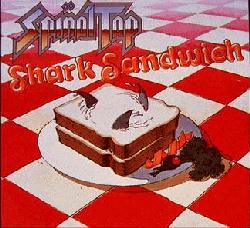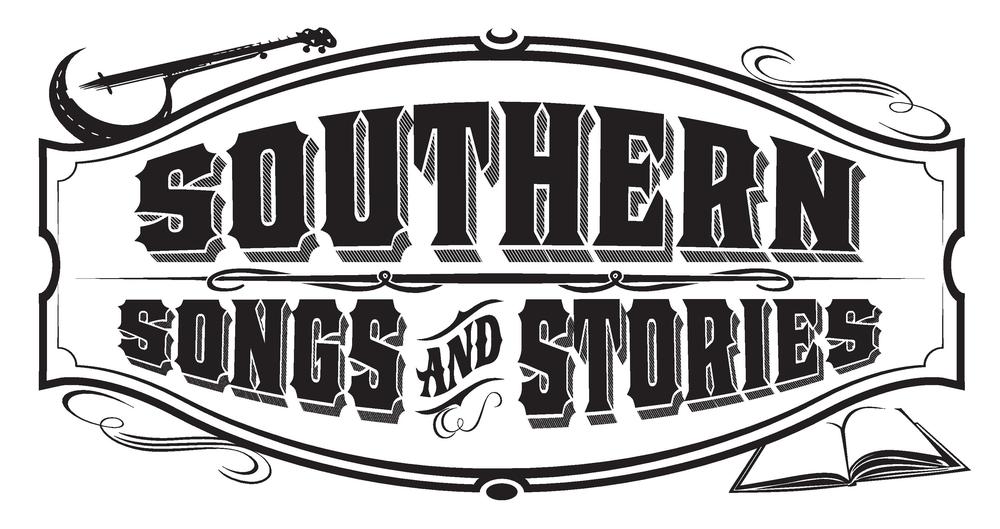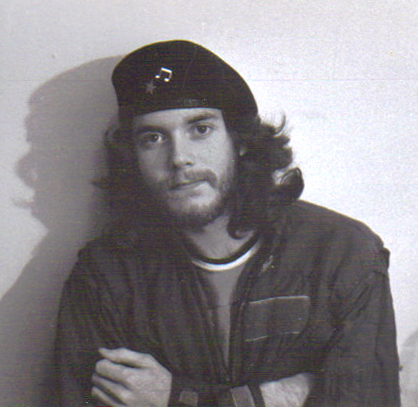Continuing our series, here is a conversation between Mary Hughes and Joe Kendrick, where they get at a few more angles of the debate:
Joe: One thing that always comes to mind is terminology. Referencing a broad genre when describing a specific piece of music is often the first step towards mutual misunderstanding. Casting a wide net like “jazz” to describe an album like Mose Allison’s Local Color, for example, ultimately fails to land this slippery fish. However, painting with too broad a brush is just one way of misusing terminology. It’s a lazy way of communicating, and most music deserves better (unless the music is bad enough to deserve a terse review, like the one that Spinal Tap received for their album Shark Sandwich). 
Another way that terms and descriptors muddy the waters is when they are overly vague, like “post-rock”, “alt-country”, or esoteric, like “glitch-pop” and other hyphenated terms, and most everything ending with “esque”. Both types often fail to convey much of anything about what they are attempting to describe, but they can serve to puff up the people employing them. Many times, this will result in glazed looks on their recipients, which can be the whole point, especially in music’s small, private circles: they don’t want unhip people glomming onto their favorite unheard-of music, so their language employs a lot of indecipherable code.
Essentially, using language that employs short-cuts to critical thinking as well as barriers to understanding and inclusion is another large aspect of what is bad in music. As a famous song says, though, this is the “same as it ever was”, and will continue as long as there are cliques and laziness.
Here’s an example using a band I never cared for: Coldplay. While I haven’t spent a great deal of time detailing reasons why I don’t like their music, the first things that come to mind when I hear their songs is that there is something too cute about them, and that they tend to play to the lowest common denominator. The next time I feel like grinding my teeth for forty-four minutes and examine Mylo Xyloto, I may come up with something far better, but it will surely never be the phrase “Beatle-esque”. Do an internet search for “coldplay+beatle-esque”, and you will get over seven million results. Being lazy might not always be wrong, but being lazy almost eight million times is never right.
Mary: Well, Joe, here’s a term that I do not like - dubstep.
Unlike the above commentary, though, I do not dislike the term ‘dubstep’ because of it being a potentially lazy descriptor; I dislike the term ‘dubstep’ because it refers to a genre of music that I cannot stand.
Unsure of what dubstep is? Allow me to illuminate you.
It is (basically) a combination of two styles of electronic music: ‘dub’ - as in drum-n-bass that you might find in reggae/ska + ‘2-step’ – as in electronic music consisting of jittery, irregular rhythms. All of this equals into the mathematical sum of my musical nightmares.
But do not take this rather subjective criticism as a slam against the world of electronic music as a whole.
I’ve been surrounding my ears with variations of electronic music for as long as I can remember - daydreaming to my father’s Tangerine Dream cassettes, singing along to a myriad of synth-heavy songs from the 1980’s (Gary Numan is a genius, you know?), dancing into the wee hours with club tracks from Inner City and then drifting happily into the realm of trance via guys like Paul van Dyk. Even now, I continue to discover some of the most fantastic and interesting electronic music by looking further into the past – people like Raymond Scott or Louis & Bebe Barron… All this name-dropping is to impress upon you, dear reader, that I am not an electronic music hater.
However, ‘dubstep’ tries even my usually unlimited musical patience.
Perhaps it is the glitch-filled vocals that make me feel like I am suffering through a really horrible drug-trip. Perhaps it is that incessant wobble-bass that sounds like a synthesized chainsaw going down the middle of my skull. Perhaps it is the fact that you cannot escape this particular sound as there are dubstep-remixes of every song that is currently ‘popular’, making generally bad songs even worse.
But more than all of these reasons is the distinct feeling I get when I hear dubstep/brostep/post-dubstep (which, c’mon people, let’s give it a damn rest) – and that is no feeling at all. That is what I require from music: feeling. Just like with any other art-form, a song is a window into the artist who created it. You get to feel their happiness, their sadness, their anger; you get to be front-and-center for the revelation of someone’s soul. And yes, you can hear that in electronic music, too. I dare anyone to listen to Ulrich Schnauss’s ‘Never Be the Same’ and not find yourself swimming in some pretty deep waters.
Not all music has to have some grand meaning, of course. Sometimes you just want to shake your ass and have some fun… But even the somewhat-vapid offerings of the 1980’s (‘Safety Dance’ anyone?) have more heart than anything Skrillex could ever deliver. Skrillex
Skrillex
Joe: Mary, I’m scratching my head right next to you when listening to dubstep. Still, it has very many fans, so there has to be something about it, right? I searched “how to like dubstep” and found this answer on Yahoo that may shed some light:
“Cam W” writes: “hi there, i am a big dubstep fan as well as an amateur dubstep artist. so i could go on for ages why i like it, but i feel that the majority of punters like it for different reasons to me. people like the filth of it all, its ment to sound as grose as possible, and the idea of the nice electro bits is to make the grose bits sound heavier because of the huge contrast. to realy get an understanding for it all you have got to go to a dubstep club, where they have proper speakers and subs (alot of dubstep cant even be heard through normal speakers because its sub bass). i find alot of people dont listen to it at all at home, but just love hearing it at a club, espeshialy after a few drinks, its heavy it's dirty, it's great!
i hope this helps you understand why people like it so much, and i completly get why some people dont like it, as it is nowhere near as melodic and i guess you could say "musical" as other electronic genres.”
Here’s another helpful response, from “Squidward”:
"Not all dubstep songs are repetitive. About the song you used as an example though (scary monsters and nice sprites - skrillex) I don't consider Skrillex to be dubstep. He's kind of his own genre in my own opinion, but I hate his sound. It sounds more like transformers having sex than anything else. :P
I love techno music in general, from house to trance to dubstep, it's all amazing. (except Skrillex) I like dubstep because of the bass, it just sounds good to me. Everyone has their own preferences I suppose.
Here's some GOOD dubstep:
Mt. Eden Dubstep: Beautiful Lies
Mt. Eden Dubstep: Still Alive
Mt. Eden Dubstep: Sierra Leone"
So now the question is, Mary: “Will you play it in a train? Will you listen in a plane?”...sorry, couldn’t resist.
While you were going all Sam I Am on us, I took the opportunity to ask some other friends on Facebook what their favorite “eyeroll” music terms were, and got some great responses from Kim Ruehl, Justin Farrar, Stephen Kaplan and Armando Bellmas, among others:
James Richards: Angular guitar
Justin Farrar: Soundscape
Kim Ruehl: Folk-electro-space-funk. THAT IS NOT A THING. Mostly I just hate hyphens in music descriptions.
Martin Anderson: Oh boy I see lots and lots that could be added. Does "evokes early Bob Dylan" count?
Kim Ruehl: "The next Bob Dylan".
Justin Farrar: Is that esoteric or just an over-invoked death wish?
Douglas P Ewen: If Bob Dylan had a child with Patti Smith
Armando Bellmas: *anything* sensibility
Jeff Eason: The musical "stylings" of so and so. Stylings is not a word. Also, an album or song is titled something. It is not entitled something.
Doug Keel: "Organically" is fast on it's way
Steven Howard: the sophisticated elegance of dream pop
Stephen H. Kaplan: CESH, stellar, ground-breaking, shoe-gaze, discordian, ethereal, and brooding are all colorful ways to say "It's rather shitty."
I got a big grin out of these and hope you might add your own favorites in the comments section here, or tweet us @linguamusica, where we are always game for some good music conversation.
The ultimate conclusion I come to when trying to understand the whole of what is bad in music is that bad music is a necessary evil. Think of any story in history and there has to be at least one bad guy somewhere in order for there to be a plot. The tale that comes the closest to being without an antagonist might be “Waiting For Godot”, however Godot fills the role through his absence, so that leaves no memorable story without one or more antagonists (I consider disaster and survival stories as having their conditions and challenges as the primary antagonists).  Still not here... The same can be said of our own musical stories: who doesn’t have music that they don’t care for? People will typically consider at least some music to be bad, and I understand that. In a way, I embrace the fact that lots of people dislike, even hate, some music that I love, and hope that they can do the same. What I don’t understand is someone who pretends to like everything. Perhaps they are telling the truth in their own mind, and they simply have not experienced anything they dislike. However, their musical plotline is going nowhere. It does not have holes; it is a hole. These people cannot be trusted with an opinion. Come to think of it, this kind of person’s undiscerning taste may be the one thing that is truly bad in music.
Still not here... The same can be said of our own musical stories: who doesn’t have music that they don’t care for? People will typically consider at least some music to be bad, and I understand that. In a way, I embrace the fact that lots of people dislike, even hate, some music that I love, and hope that they can do the same. What I don’t understand is someone who pretends to like everything. Perhaps they are telling the truth in their own mind, and they simply have not experienced anything they dislike. However, their musical plotline is going nowhere. It does not have holes; it is a hole. These people cannot be trusted with an opinion. Come to think of it, this kind of person’s undiscerning taste may be the one thing that is truly bad in music.


